
The Republic of Korea Armed Forces, also known as the ROK Armed Forces, are the armed forces of South Korea. The ROK Armed Forces is one of the largest and most powerful standing armed forces in the world with a reported personnel strength of 3,600,000 in 2022.
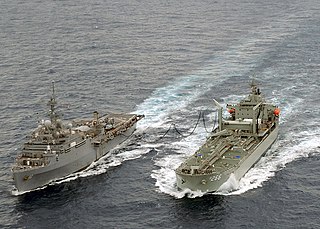
A replenishment oiler or replenishment tanker is a naval auxiliary ship with fuel tanks and dry cargo holds which can supply both fuel and dry stores during underway replenishment (UNREP) at sea. Many countries have used replenishment oilers.
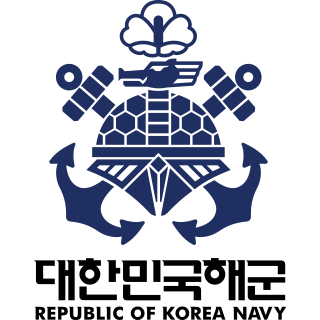
The Republic of Korea Navy, also known as the ROK Navy or South Korean Navy, is the naval warfare service branch of the South Korean armed forces, responsible for naval and amphibious operations. The ROK Navy includes the Republic of Korea Marine Corps, which functions as a branch of the Navy. The ROK Navy has about 70,000 regular personnel including 29,000 Republic of Korea Marines. There are about 140 commissioned ships in the ROK Navy. The naval aviation force consists of about 70 fixed-wing and rotary-wing aircraft. The ROK Marine Corps has about 300 tracked vehicles including assault amphibious vehicles.

The Sejong the Great-class destroyers, also known as KDX-III, are three guided-missile destroyers of the Republic of Korea Navy (ROKN).

The Gwanggaeto the Great-class destroyers, often called KDX-I, are destroyers, but are classified by some as frigates, operated by the Republic of Korea Navy. It was the first phase of ROKN's KDX program, in moving the ROK Navy from a coastal defence force to a blue-water navy.
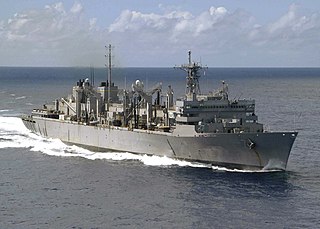
USNS Rainier (T-AOE-7), is a Supply-class fast combat support ship and the third US Navy vessel named after Mount Rainier. The ship was christened on 28 September 1991 by the ship's sponsor, Mrs. Suzanne Callison Dicks, wife of Congressman Norm Dicks, and commissioned as "USS Rainier (AOE-7)", on 21 January 1995 at Bremerton, Washington.
The Republic of Korea Navy was founded on November 11, 1945 as Marine Defense Group after Korea was liberated from the Empire of Japan. The ROK Navy is the oldest service within the ROK Armed Forces. In 2015, the South Korean navy celebrated its 70th anniversary.

The Pohang-class PCC is the low-end complement of the high-low mix domestic naval construction plan of the Republic of Korea Navy under the 1st Yulgok Project (1974-1986) for the Republic of Korea Armed Forces. It was originally planned as a Batch II production of Donghae-class corvette, but many changes on overall design, notably applying the hull design of Ulsan-class frigate, reclassified the ship to its own class. The ship is designed for patrolling maritime border, including the Northern Limit Line, protecting the littoral zone, and combating the North Korean vessels.

ROKS Dokdo (LPH-6111) is the lead ship of the Dokdo-class amphibious assault ship of the Republic of Korea Navy, launched on 12 July 2005 at the shipyard of Hanjin Heavy Industries & Constructions Co. in Busan. ROKS Dokdo was the flagship of the Fifth Component Flotilla of the Korean Navy until the launch of ROKS Marado in 2018. Previously, this title was held by the 9,000-ton at-sea Underway Replenishment (UNREP) support vessel ROKS Cheonji.
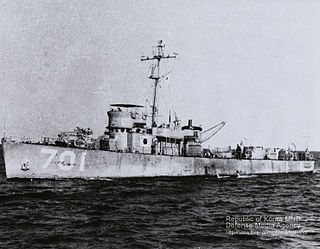
USS PC-823 PC-461-class submarine chaser laid down on 2 June 1943 at the Leathem D. Smith Shipbuilding Company in Sturgeon Bay, Wisconsin; launched on 15 January 1944; and commissioned on 24 July 1944.

The Cheonji-class fast combat support ship are fast combat support ships in service in the Republic of Korea Navy. After commissioning in the 1990s, they significantly increased the Korean Navy's ocean operation ability, especially in foreign domains. They participated in events using their wide deck and contributed to the development of civil-military relations.

ROKS Yulgok Yi I (DDG-992) is the second ship of the Sejong the Great-class destroyers that was built for the Republic of Korea Navy. She was designed around the Aegis Combat System and was named after philosopher and scholar of the Joseon Dynasty, Yulgok Yi I.

ROKS Soyang (AOE-51) is a fast combat support ship of the Republic of Korea Navy; she is named after the Soyang River.

ROKS Gyeongnam (FFG-819) is the second ship of the Daegu-class frigates in the Republic of Korea Navy. She is named after the place, Gyeongnam. The ship was launched in 2019 and commissioned in 2021.
ROKS Seoul (FFG-821) is the third ship of the Daegu-class frigate in the Republic of Korea Navy. She is named after the capital, Seoul.

ROKS Cheonji (AOE-57) is the lead ship of the Cheonji-class fast combat support ship (AOE) in the Republic of Korea Navy. She is named after the lake, Cheonji.

ROKS Hwacheon (AOE-59) is the third ship of the Cheonji-class fast combat support ship (AOE) in the Republic of Korea Navy. She is named after the lake, Hwacheon.
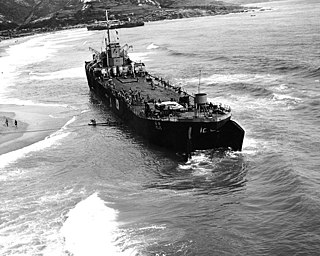
USS LST-120 was a LST-1-class tank landing ship in the United States Navy during World War II. She was later transferred to the Republic of Korea Navy and renamed ROKS Munsan.

The Soyang-class fast combat support ship (AOE-II) are fast combat support ships in service in the Republic of Korea Navy.















